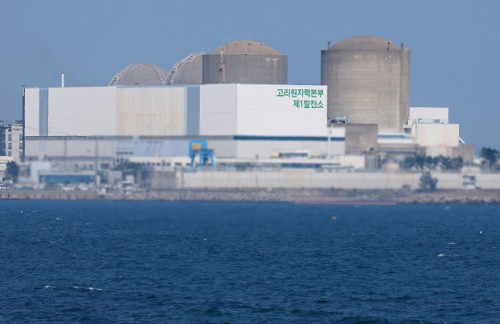 |
| Kori Unit 1 (first from the right), located in Jangan-eup, Gijang County, Busan, is set to be dismantled following final approval from the Nuclear Safety and Security Commission on June 26. / Source: Yonhap News |
South Korea has officially begun the process of dismantling its first nuclear power plant, Kori Unit 1, marking a significant step toward entering the global nuclear decommissioning market, estimated to reach 500 trillion won ($360 billion) by 2050.
The Nuclear Safety and Security Commission (NSSC) approved the decommissioning plan during a general meeting on June 26, clearing the way for full-scale dismantling of the reactor, located in Jangan-eup, Gijang County, Busan. Kori Unit 1 was permanently shut down in 2017 after 40 years of operation.
The plant’s operator, Korea Hydro & Nuclear Power (KHNP), will immediately begin dismantling activities. The company has already secured all core technologies required for the process and completed development of eight commercialized technologies. It plans to develop the remaining 11 pieces of key equipment by 2027. KHNP also began decontamination of Kori 1 in May 2024, a preparatory step that removes radioactive substances and is carried out regardless of regulatory approval.
Although nuclear decommissioning typically takes around 15 years, the process—excluding licensing—is expected to last at least a decade.
The government is supporting the effort through institutional reforms. A new special law on high-level waste disposal, which recently passed the National Assembly’s Legislation and Judiciary Committee, will facilitate the construction of spent fuel storage facilities, a crucial component in streamlining reactor decommissioning.
Despite these developments, experts warn that technological capacity remains the biggest hurdle. As of May, only four countries— the United States, Germany, Japan, and Switzerland—have actual decommissioning experience. Of the 25 reactors decommissioned globally, most are in the U.S., which remains the only country to have dismantled large-scale commercial reactors similar to Kori 1. Other countries have focused on prototype or research reactors.
Industry insiders believe that a successful decommissioning of Kori 1 would position South Korea as a leader in the emerging market and provide opportunities to accumulate know-how across the entire lifecycle—from spent fuel management to site repurposing.
The International Atomic Energy Agency (IAEA) projects that the global nuclear decommissioning market will reach 500 trillion won by 2050, making it one of the few untapped frontiers in the energy sector.
Experts view this milestone as a rare opportunity to complete Korea’s nuclear technology cycle, from construction to dismantling. “This is meaningful in that it completes the full spectrum of nuclear technology from building to decommissioning,” said Chung Beom-jin, a nuclear engineering professor at Kyung Hee University. “The key will be securing capabilities through strategic collaboration with foreign partners.”
Most Read
-
1
-
2
-
3
-
4
-
5
-
6
-
7





















